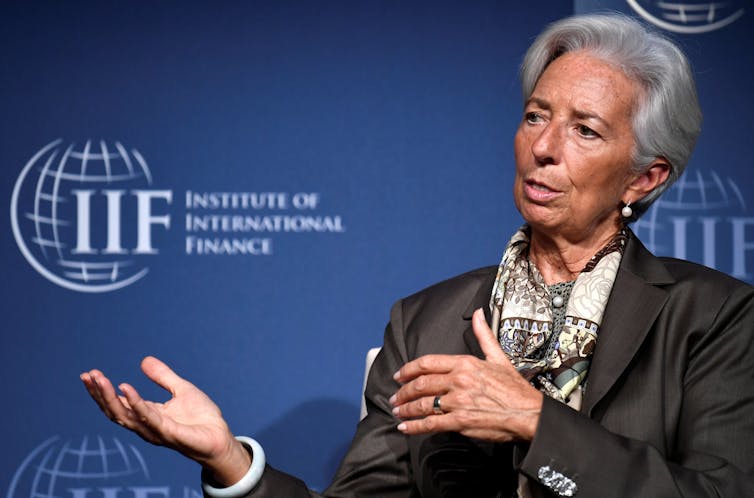
IMF Managing Director Christine Lagarde at the “G20: Compact With Africa”.
Reuters/Mike Theiler
Prudence teaches that societies experiencing difficult and uncertain times should hope for the best but prepare for the worst.
South Africa should take this lesson seriously. It is facing a serious crisis. South Africa’s economy is growing too slowly to address its profound challenges of poverty, inequality and unemployment. Social tensions are rising. Business is not transforming quickly enough. The governance and solvency of key state-owned enterprises (SOEs) are collapsing. Government finances are deteriorating. Credit downgrades may limit government access to finance. The institutions of governance are decaying. The complex political situation is paralysing policymaking.
Countries facing analogous crises of confidence like Nigeria, Poland and Turkey have had to seek IMF support.
South Africa can hope that the situation will improve. But it should also plan for the possibility that it will not and that confidence in the government’s ability to manage its deteriorating financial situation will evaporate. This will lead to both higher borrowing costs and reduced access to financing for the government and state owned enterprises. It could also lead to state owned enterprises defaulting on their debts and their creditors calling in their government guarantees. As government loses the ability to fund its operations, it will be forced to turn to the IMF. It is the one organisation that can help it regain access to financing – on condition that South Africa agrees to implement an IMF approved set of reforms.
No-one wants an IMF programme for South Africa. First, it means the government accepting an outsider, dominated by rich countries, overseeing its economic policies. Second, IMF support will be conditioned on the country agreeing to painful reforms such as:
- Reducing the government’s budget deficit and the current account deficit so that it can meet its financial obligations
- Deregulation and labour market reforms designed to encourage investment.
But if South Africa begins preparing for this possibility it may be able to mitigate its worst effects and be ready to exploit whatever opportunities it creates.
Negotiating with the IMF
The South African government has considerable experience dealing with the IMF, which regularly visits each of its member states to consult about the state of its economy— the most recent IMF mission visited South Africa in early November. However, it is over 20 years since South Africa negotiated a financing arrangement with the IMF.
Unless challenged, the IMF is likely to condition its financial support on a standard recipe of reforms. However, over time the IMF has become more amenable to supporting the programmes proposed by its member states. It has learned that, while there are similarities between macro-economic crises in different countries, there is more than one strategy for resolving such crises. In fact, the optimal solution depends on each country’s institutional arrangements, history, and particular economic, social, environmental and political characteristics. It also depends on the impact of macro-economic policies on such social factors as gender, equity and environmental and social sustainability.
Yanis Varoufakis, former Greek finance minister, reports in his book on his experiences negotiating with Greece’s creditors that countries like Poland, through careful planning and shrewd negotiations, were able to convince the IMF to follow their plan rather than the IMF’s standard approach. His book also shows that the cost of failing to prepare adequately for negotiations like these can be very high indeed.
So what should South Africa do to ensure that it gets the best possible deal?
First, South Africa must establish clear and realistic objectives for the plan that it wants the IMF to support. Second, it must get its diplomatic ducks in a row so that it can strike the best possible deal.
Fixing the budget
As a priority South Africa should focus on restoring a sustainable budget situation. This will require government to make some painful policy choices about levels of expenditures as well as the purposes for which funds are allocated.
The government can build confidence in these choices if it can show that:
- the benefits exceed the costs and that the costs are being equitably shared.
- Policy choices are based on both the human rights imperatives stipulated in the South African Constitution and on promoting growth.
- it’s serious about addressing the governance problems in state owned enterprises and government departments.
- it is complying with the legal procedures applicable to government finances and the open budgeting processes that it used in the past.
Finally, government must encourage other social actors – such as business and labour who have contributed to the crisis – to help mitigate the pain. A demonstration of broad support would help convince the IMF to support the government’s strategy.
Diplomacy
As Varoufakis’ experience shows, the cost of under-estimating the impact of international economic diplomacy on the outcomes of complex international financial negotiations can be unacceptably high.
The South African government must therefore prepare to sell its programme to the IMF. This requires it to appoint negotiators who have a good understanding of both the IMF as an institution and global financial diplomacy. They can make the South African case in the way that is most likely to convince the IMF staff and Board of Executive Directors to support the South African programme.
These negotiators should also seek to exploit all the benefits that South Africa can harvest from its membership in the institutions of global economic governance. For example, they can tap the experience and expertise of groups like the G24, a lobby group for the interests of IMF developing member states in which South Africa participates, to help it prepare for these negotiations.
Danny Bradlow, SARCHI Professor of International Development Law and African Economic Relations, University of Pretoria
This article was originally published on The Conversation.
No comments:
Post a Comment